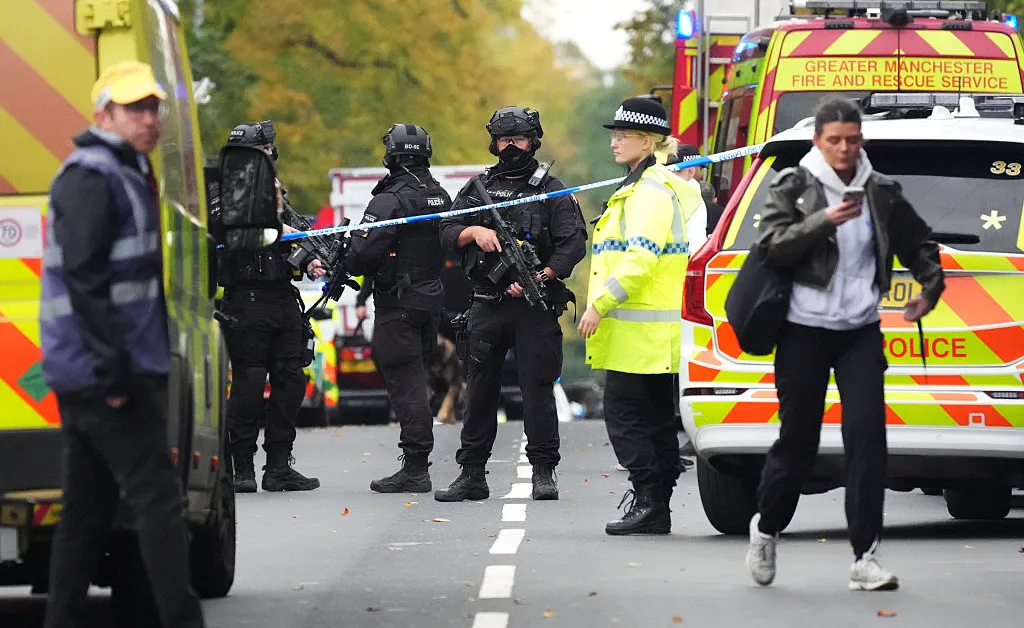The Manchester terrorist attack 2025 shook the United Kingdom once again, reminding the world of the continuous threat of extremism and the resilience of humanity in the face of hate. On October 2, 2025, a peaceful morning turned into horror when a man launched a violent assault outside a synagogue in Manchester. The tragic event left several dead and injured, reigniting national discussions on terrorism, security, and community unity.
The Incident: How the Attack Unfolded
According to police reports, the attacker used a vehicle to ram worshippers outside the Heaton Park Hebrew Congregation Synagogue during the Jewish holy day of Yom Kippur. After crashing into bystanders, he exited the car and began stabbing people nearby.
Witnesses described the scene as “complete chaos,” with worshippers fleeing in panic while others bravely tried to shield those under attack.
Within minutes, armed police responded to emergency calls. The attacker reportedly wore what appeared to be an explosive belt — later confirmed to be fake — creating confusion and fear among first responders. Police were forced to open fire, killing the assailant at the scene and preventing further casualties.
Casualties and Community Impact
The attack resulted in three deaths, including two innocent worshippers and the attacker himself. Several others were injured, some critically. Among the victims were Melvin Cravitz (66) and Adrian Daulby (53), both long-standing members of Manchester’s Jewish community.
Tragically, it later emerged that Daulby may have been accidentally struck by police gunfire in the chaos. This revelation led to an internal review of police protocols during active terror incidents.
Local synagogues and Jewish organizations across the UK held candlelight vigils to honor the victims. The message was clear — Manchester will not be divided by fear.
The Attacker and His Motive
Authorities identified the attacker as Jihad al-Shamie, a 35-year-old British citizen of Syrian descent. Investigations revealed that during the attack, he called emergency services (999) and declared allegiance to the Islamic State (ISIS). Although he had no known history of extremism, he was reportedly out on bail for an unrelated criminal case.
Counter-terrorism experts believe the attack was a lone-wolf operation, inspired by extremist ideology rather than coordinated by any larger network. However, digital forensic teams continue to examine his online activity and communications.
Government and Law Enforcement Response
Prime Minister Keir Starmer condemned the assault as a “cowardly act of hate,” pledging that “terror will never defeat freedom or faith.” The Home Office immediately increased police presence at religious sites across the UK, especially synagogues and mosques, to prevent copycat incidents.
The Greater Manchester Police and UK Counter Terrorism Command launched a full investigation, arresting several individuals for questioning in the days following the attack. Most were released without charge, but the investigation into possible online collaborators remains active.
This tragic event also tested the new Terrorism (Protection of Premises) Act 2025, commonly known as Martyn’s Law, named after a victim of the 2017 Manchester Arena bombing. The law requires public venues to implement stronger anti-terror measures — a framework that may expand following this latest tragedy.
Public Reaction and Global Condemnation
The world reacted with shock and solidarity. Leaders from across Europe, the United States, and Israel condemned the attack and expressed condolences. Social media flooded with messages of support under hashtags like #PrayForManchester and #StandAgainstHate.
Faith leaders from Christian, Muslim, and Sikh communities in Manchester united in public prayer services, sending a powerful message of peace. Rabbi Eli Rosen, one of the local religious leaders, stated,
“Our community mourns, but we will not respond to hate with hate. Manchester stands for unity, not division.”
Broader Implications for Security and Society
The Manchester terrorist attack 2025 raised tough questions about how societies detect and prevent “lone-wolf” radicalization. Since the attacker was not on any known extremist watchlist, the event exposed the challenges of identifying threats from individuals radicalized online.
Experts also pointed out the psychological and social dimensions of modern terrorism — where ideological extremism often mixes with personal grievance or mental instability.
Additionally, the mistaken death of one victim by police fire has renewed debate about tactical training during fast-moving terror incidents. Calls have been made for advanced simulation training for armed response units to minimize collateral damage in chaotic situations.
Hope, Healing, and Moving Forward
Despite the sorrow, Manchester once again showed its trademark resilience. The city, still healing from the 2017 arena bombing, united across all communities. Thousands gathered in Albert Square for a vigil that ended with a single message projected on the Town Hall building:
“Light will always conquer darkness.”
Counseling centers and interfaith groups have since stepped up to support affected families. The Jewish Leadership Council and Manchester City Council announced a joint program to improve local community relations and enhance protection at places of worship.
Conclusion
The Manchester terrorist attack 2025 stands as another painful reminder that terrorism is not just an assault on individuals but an attack on humanity’s shared values of peace and tolerance. Yet, amid fear and loss, Manchester’s people have once again proven their strength, compassion, and unity.

